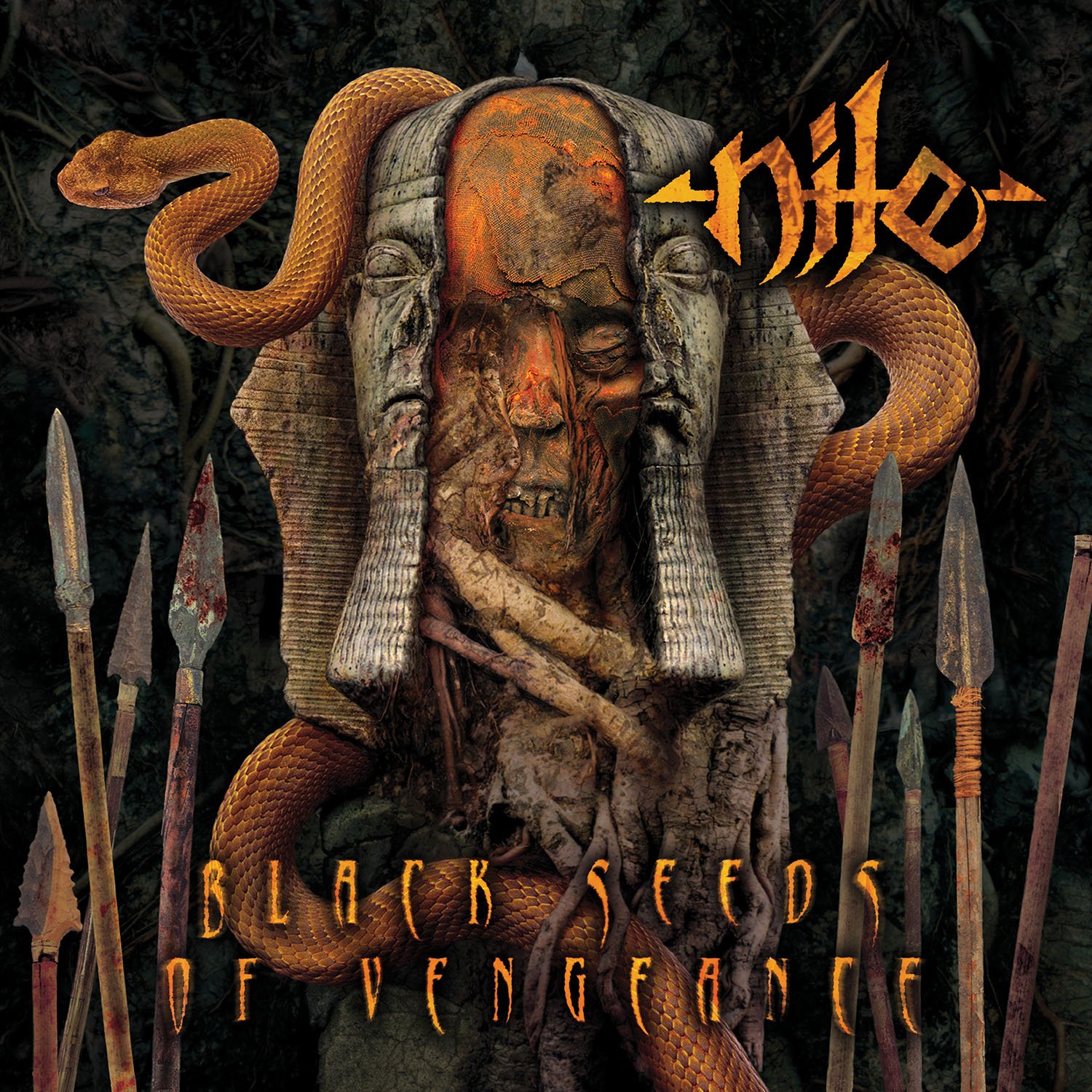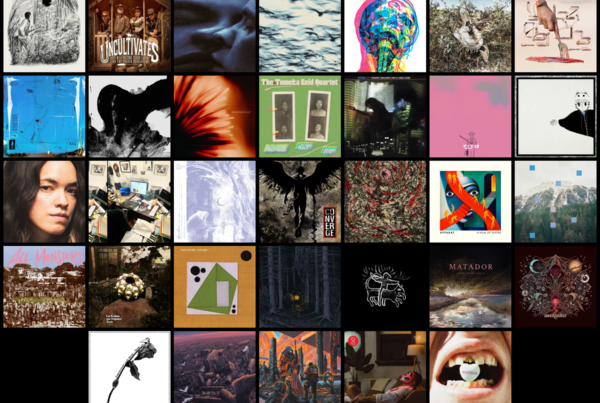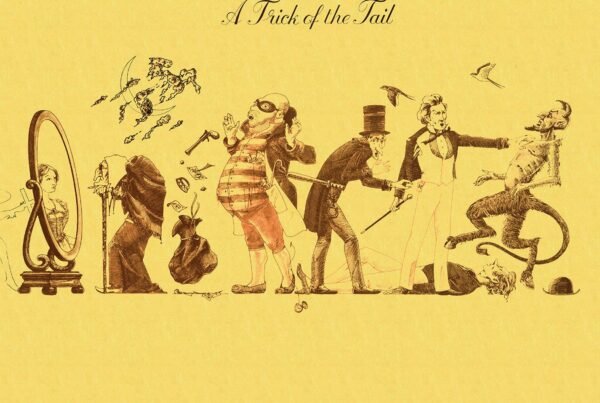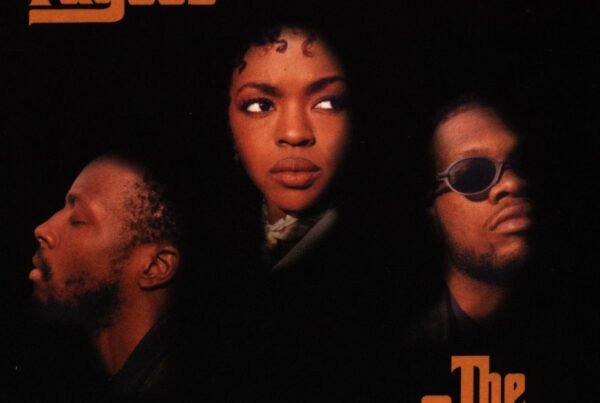‘Black Seeds of Vengeance is an album that wrangles the sounds that it wants to employ to tell the story, not the other way around.‘
-Jacob Walters

Release date: September 5, 2000 | Relapse Records | Facebook | Instagram | Website
Metal and mythology always made for easy bedfellows; after all, where else could you go to easily find some vivid, gnarly stories to spruce up your music with? And as far as mythology goes, Ancient Egypt had some of the most imaginative stories and imagery, so it’s no surprise bands like tech-death mainstays Nile found much intrigue and potential in its tales. Black Seeds of Vengeance is where they started to cement their legacy 25 years ago.
Iain Ferguson
There’s one thing that always comes up when discussing extreme metal with anybody: everyone who gets into that scene has That One Band. The one that came to them early and rewrote the way they define ‘heaviness’ in music. For me personally, that band is Nile. I still remember the summer of 2009, being lent a copy of Annihilation of the Wicked by a family member. To that point, the heaviest stuff I had on regular rotation was probably Venom or Slayer, and hearing those first notes of “Cast Down the Heretic” practically blew my head clean off. Since then, Nile always stood as a paragon of heaviness and a band I could always rely on for expertly written, wildly technical brutal death metal. Of course, that template had to be established somewhere, and that album would be today’s topic; Black Seeds of Vengeance.
To be sure, Nile was off to a pretty unique start when they debuted with Amongst the Catacombs of Nephren-Ka, but 2000’s Black Seeds of Vengeance marked an uptick in almost all the features that define Nile’s sound. It marked the recorded debut of Dallas Toler-Wade on vocals and guitar, who would prove a perfect foil to main man Karl Sanders’ own gutturals and acrobatic riff work for the better part of two decades. This partnership kicked the brutality of Nile’s previous work to dizzying heights, firmly establishing the band not just as a force of sheer brutality, but also as a dazzlingly technical outfit. At the same time, Black Seeds of Vengeance marked a serious uptick in the band’s songwriting ambitions.
Beyond the moody intro of “Invocation of the Gate of Aat-Ankh-er-en-Amenti”, “Black Seeds of Vengeance” proper kicks off proceedings in full force, winding through riffs and leads with wild abandon before climaxing with a stage-ready chant of the album title underpinned by powerful synths. Fan-favorite “Masturbating the War God” was similarly diverse, revelling in the flashy technicality of its serpentine riffing before building to a slower, doomier passage winding to a more symphonic grandeur before returning to a brutal finish. That doomier energy shines through perfectly with “The Black Flame” as it trudges along dramatically, fully embracing the band’s love of Egyptian and Middle Eastern scales and progressions.
Comparatively, the short scorchers “Multitude of Foes” and “Chapter for Transforming Into a Snake” work as direct bursts of energy, while “Libation Unto the Shades Who Lurk In the Shadows of the Temple of Anhur” (they never lacked for great song titles) eschew metal entirely for those aforementioned Middle Eastern climes, signposting many atmospheric tracks to come while also feeling darker and more menacing than any that would follow. And then, of course, there’s the nine-minute monolith “To Dream of Ur”, which brings everything together for an album high-point that’s atmospheric, dynamic, and completely enrapturing in effect. As much as I’m a genuine sucker for later Nile epics like “Unas, Slayer of the Gods”, “Von Unaussprechlichen Kulten”, and “4th Arra of Dagon”, the template was set here, and “To Dream of Ur” stands proud against those later examples as a particular favorite in Nile’s catalog.
That’s not to say Black Seeds of Vengeance is my favorite Nile album, as it does retrospectively feel just slightly like a rough blueprint of the band’s sound. The production is a little grittier and dirtier than one might expect if they heard later Nile albums that had been produced by Neil Kernon (deservedly legendary for his production work on Hall & Oates’ Private Eyes and about a thousand other albums), though I do think it suits the more evil vibe of the album well. And while all the songs across Black Seeds of Vengeance are dazzling in their own right, the band’s songwriting would only strengthen from here on out, taking the band higher and higher in quality and popularity.
Warts and all, Black Seeds of Vengeance feels like the true birth of the Nile that ended up just about as close to a household name as a death metal band can be. I can only imagine how unique their blend of brutality and world elements felt back in 2000, and hell, they still sound unique and singular to this day. Off hand, only the phenomenal Elvenefris by Lykathea Aflame felt like a good match for Nile’s approach at that time (and they were more New Age and positive anyway), and it would still be a few years before Behemoth made huge waves with their own blending of death metal and Middle Eastern scales before abandoning that for better (The Satanist) or worse. Maybe a few bands have since taken up the specific mantle of Nile’s early work (Apep comes to mind), but even now, twenty five years after Black Seeds of Vengeance solidified their personality, Nile doesn’t really have any great imitators despite their stature. They’re unique and monolithic in the death metal universe, and Black Seeds of Vengeance is where they first sculpted their likeness into stone.
Jacob Walters
It’s been a while since I’ve sat behind the keyboard to express my love for something. Lately, it’s been all work and no play but today that changes. Nile, baby. The band that will bludgeon you to death for an hour or so every time they put out a record. Today we get to talk about the superiority of Black Seeds of Vengeance, their second studio album from a quarter century ago. I feel old. Regardless of my age, though, Karl Sanders and company proved that they were locked into Egyptian themes, blast beats, and pretty damn long song titles with their second album.
One of the things that I love about the earlier Nile records is their proclivity to lean into theatrics and a very intentional atmosphere. And these things are not just sprinkled in with a few intro tracks or acoustic instrumentals: they’re part of every song in some way. I personally think that Black Seeds of Vengeance is my favorite in this regard because to me it’s always wearing its identity and heart on its sleeve. The choral passages on “Defiling the Gates of Ishtar”, the bombastic orchestration on arguably the heaviest track, “Masturbating the War God”, and hell even the title track with all its heft expands beyond the paint-by-numbers brutal technical death metal tropes and employs a congruent and apt atmosphere that my brain latches onto. Some days I wake up with Dallas Toler-Wade’s voice in my head belting out, ‘BLACK. SEEDS. OF VENGEANCE. BLACK. SEEDS. OF VENGEANCE.‘
Atmosphere? Check. Riffs? Well, let’s talk about that. Nile’s style of brutal death metal is often so active that picking a single moment or riff in a song to get giddy about can take some careful and discerning ears. Or you could just be like me and pick the riffs that back the verse in “The Black Flame.” This song is one of the more daring compositions on BSoV as it toys with a slower tempo, bathes in atmosphere, and turns what seems like a transitional track (nope that’s the one after!) into one of the most dynamic and engaging songs on the album. It’s moments like these that make me love the sensibilities on these classic Nile albums. I’d also say the riff/groove of “Nas Akhu Khan she en Asbiu” is probably the best riff on this thing. What an absolute monster of a song as well and the drumming from Derek Roddy (Malevolent Creation, Hate Eternal, Blotted Science) is a masterclass in how to play a goddamn machine gun.
I think I’ve stated why I love this record a lot already, but let me just restate once again that the dynamics and variety of this album make it feel more like an album that is using death metal to tell tales of ancient Egypt rather than a metal band just reaching for some unique aesthetic to set them apart and it still just sounds like everything else in the genre. Black Seeds of Vengeance is an album that wrangles the sounds that it wants to employ to tell the story, not the other way around. It really feels like a complete and thorough idea that never expands beyond its own canvas but uses every inch of it.
The slow burn trio of songs that wrap up the record do so aptly and again songs like “To Dream of Ur” and “The Nameless City of the Accursed” are bathed in atmosphere, traditional Egyptian instrumentation, and a foreboding doom. There’s few emotions that are left out of this album. From start to finish its one of my favorite death metal albums and probably my second-favorite Nile record, neck-and-neck with Annihilation of the Wicked. I spin Black Seeds of Vengeance to this day. I love it, I think the neighbors like it, and I think you’ll like it too.





